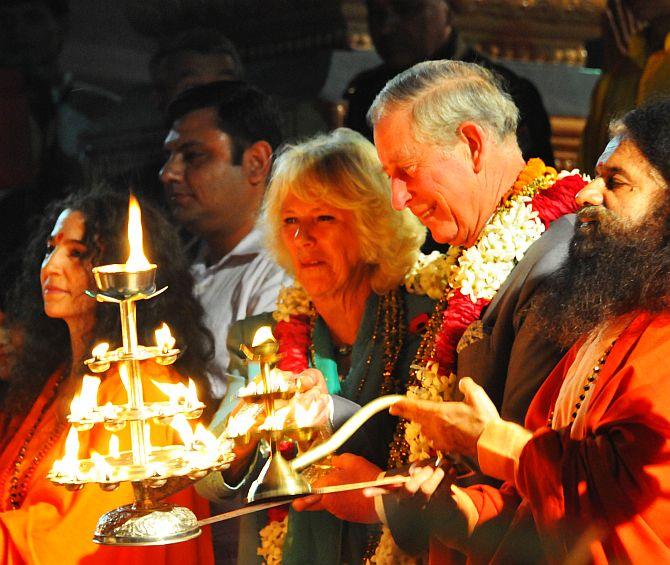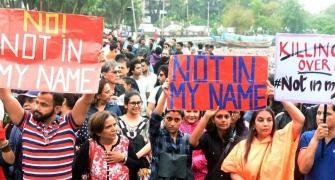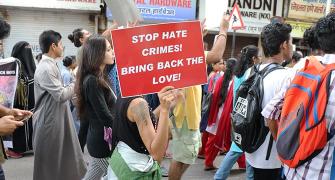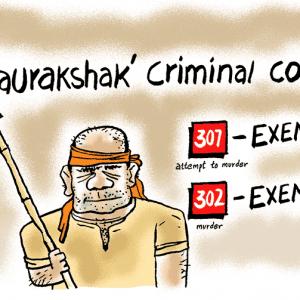'India's reputation is not and cannot be dependent on the whimsical opinions of some obscure foreign advisory committee packed with Hindu-phobic acolytes,' declares Vivek Gumaste.

The harsh and uncalled for indictment of India as a CPC, or a 'country of particular concern' by the United States Commission on International Religious Freedom (USCIRF) has raised the hackles of the Indian establishment, caused consternation among many Indians and given the traditional Narendra Modi bashers a handle to excoriate the government.
In making this decision, the USCIRF claimed in its annual report (2020): 'In 2019, religious freedom conditions in India experienced a drastic turn downward, with religious minorities under increasing assault.'
'Following the Bharatiya Janata Party's (BJP) re-election in May, the national government used its strengthened parliamentary majority to institute national level policies violating religious freedom across India, especially for Muslims.'
But who or what is the USCIRF?
Is it a credible body whose words carry the weight of moral authority or is it a fly by night cabal that indulges in dubious machinations and whose motives are suspect?
How valid is this appraisal and what are its ramifications?
The USCIRF, according to its Web site, defines itself as 'an independent, bipartisan US federal government commission dedicated to defending the universal right to freedom of religion or belief abroad'.
Further, the commission claims that it 'reviews the facts and circumstances of religious freedom violations and makes policy recommendations to the president, the secretary of state, and Congress'.
But its modus operandi is anything but what is defined in its preamble.
When scrutinised carefully, its reports prove to be a compendium of self-serving interpretations, questionable factuality and reckless hyperbole -- all cocktailed together to produce an inflammatory assessment of sensational value; the assessments are neither objective nor sincere.
The USCIRF has two categories of condemnation derived from the International Religious Freedom Act of 1998, United States (IRFA): CPC (countries of particular concern) and the lesser category of SWL (special watch list).
A CPC is a country where the government engages in or tolerates 'particularly severe' violations of religious freedom; severe violations being defined as ones that are 'systematic, ongoing, [and] egregious'.
Along with India in 2020, the USCIRF designated 13 more countries as CPCs: this list includes China, Pakistan, Burma, North Korea and Saudi Arabia.
First, to club India with the likes of Pakistan, China, Saudi Arabia, North Korea and Burma is an egregious (to use the USCIRF's own terminology) violation of the basic tenets of honesty, objectivity and rationale; it makes a mockery of common-sense.
There will be few takers for this characterisation at either the country or on an individual level.
In support of its recommendation, the USCIRF lists four areas of concern: Citizenship (Amendment) Act and the National Register of Citizens; anti-cow slaughter laws; anti-conversion laws; and religious freedom in Jammu and Kashmir.
The arguments put forth with regard to these four issues are too fluid and too nebulous to count as sound rationale.
The CAA was not an authoritarian diktat. It was a legislation passed by a democratically elected Parliament in the largest democracy in the world. Even its opponents grudgingly agree that the CAA viewed independently is non-controversial and serves a noble cause.
With regards to its combination with the NRC which is yet to be implemented and whose fate is uncertain, the jury is still out -- no one has been able to adequately explain how this will discriminate only against Muslims.
For all the brouhaha engendered by the CAA and the NRC one must realise that at this juncture everything is pure speculation -- unsubstantiated alarmism and scare-mongering. Official committees cannot base their recommendations on far-fetched conjectures.
With regard to anti-cow slaughter vigilantism, the analysis is too sketchy to have any constructive value.
The USCIRF claims that 'Cow protection has been promoted as a key issue by the BJP and the Rashtriya Swayamsevak Sangh (RSS)' and 'since the BJP came to power in 2014, there have been over 100 attacks, amounting to over 98 percent of such attacks since 2010', making it appear as if the BJP instigated the violence.
Not true. Cow protection is not a whim of the BJP or RSS alone but an integral facet of life in India. Hindus, Sikhs, Jains and Buddhists -- all revere the cow and Article 48 of the Constitution prohibits the killing of 'cows and calves'.
Anti-cow slaughter laws have existed throughout Indian history -- during the reign of Maharaja Ranjit Singh and even during the rule of some Mughal emperors.
Violence related to the killing of cows is not new, but goes back hundreds of years and a classic ploy adopted by some to provoke communal tension.
Rather than invoke religious xenophobia, India's Supreme Court rightly described the current cow slaughter vigilantism as a law and order problem related to 'mobocracy', the bane of Indian society; accordingly, the Supreme Court issued directives to deter such crimes.
Prime Minister Modi has repeatedly condemned these crimes and several states -- Manipur, Rajasthan and West Bengal -- have passed anti-lynching bills.
In July 2019, the state appointed law commission in BJP-ruled Uttar Pradesh formulated a bill, the Uttar Pradesh Combating of Mob Lynching Bill (2019) that proposes imprisonment up to 10 years for perpetrators.
The government's actions, the Supreme Court guidance and anti-lynching bills clearly disprove the claim that cow vigilantism is 'systematic' or 'ongoing'.
Likewise, its censure of anti-conversion laws does not pass muster.
Conversion is anathema to all Hindus and not the BJP alone. Mahatma Gandhi, the conscience of modern India, called conversions the 'deadliest poison' and declared: 'If I had the power and could legislate, I should stop all proselytising.'
Anti-conversion laws are meant to deter religious evangelists from using fraud, allurement or force to exploit the illiterate poor masses.
Eight states (Odisha, Madhya Pradesh, Arunachal Pradesh, Chhattisgarh, Gujarat, Himachal Pradesh, Uttarakhand, Uttar Pradesh and Jharkhand) have anti-conversion laws; several of them were enacted by Congress governments including the Himachal Pradesh Freedom of Religion Bill 2006.
The Supreme Court of India has clarified that Article 25 which gives all Indians the right to 'freely profess, practise, and propagate religion' does not axiomatically mean the right to convert.
In the case of Rev Stanislaus vs State Of Madhya Pradesh (1977) the Supreme Court proclaimed: 'There is no fundamental right to convert another person to one's own religion because if a person purposely undertakes the conversion of another person to his religion, as distinguished from his effort to transmit or spread the tenets of his religion, that would impinge on the "freedom of conscience" guaranteed to all the citizens of the country alike'.
How can laws that echo Gandhi's thoughts and are in line with the Constitution be viewed as immoral and how can a practically defunct law (the USCIRF report itself states 'to date, however, there are no known convictions for forced conversion') count as egregious violation?
Lastly, to deem a political statute (the abrogation of Article 370) that abolishes political apartheid as an assault on the religious freedom of Kashmiri Muslims is a convoluted and laughable piece of logic.
Moreover, when one factors in the ethnic cleansing of the minority Hindus (250,000 Hindus have been driven out) and the continued oppression of Shia Muslims (prevented by law to take out processions) in Sunni majority Kashmir, the rationale becomes even more bizarre.
There is a clear anti-Hindu strain that runs through the arguments: opposition to the CAA, cow slaughter, anti-conversion laws that Gandhi endorsed, and championing religious freedom in a Hindu-cleansed Kashmir.
Cut to the chase, the USCIRF report is a malicious Hindu-phobic dossier out to undermine the robust and pluralistic values of an ancient civilisational State by raising the bogey of religious discrimination. It is by no means an altruistic attempt to enforce moral tenets.
Most foreign affairs expert agree that this report is unlikely to have any significant impact on major Indo-US bilateral issues; some ex-ambassadors, however, worry about its 'reputational'; value.
India's reputation is not and cannot be dependent on the whimsical opinions of some obscure foreign advisory committee packed with Hindu-phobic acolytes.
India's reputation stems from its own unswerving confidence in its traditional moral values that go back thousands of years.
India is a moral giant: The birthplace of Buddha, Mahavira, Guru Nanak and Mahatma Gandhi and home to what is arguably the only major secular religion of the world.
If there is any global authority on morality today it is India despite the supposed deficiencies blown out of proportion by our ninny homegrown liberals.
It is unfortunate that, even 70 years after Independence and in the midst of a powerful indigenous renaissance, there are cohorts who jump to attention at the monosyllabic rebukes from the West without even pausing to evaluate its validity as if we are an errant child -- an ingrained inferiority complex
We need to move past this. Let us not be apologetic or be defensive.
Instead, we need to aggressively demolish the false claims of organisations like the USCIRF and call them out in no uncertain terms.
The USCIRF report is a fictional document, sans logic, sans facts and sans common sense.
Not surprisingly, two of its commissioners chose to dissent. Commissioner Gary L Bauer wrote: 'I must dissent from& placing India in a gallery of rogue nations in which it does not belong.'
That is the truth, and the report must be negated in totality.
Academic Vivek Gumaste, who is based in the United States, is the author of My India: Musings of a Patriot. You can e-mail the author at gumastev@yahoo.com










